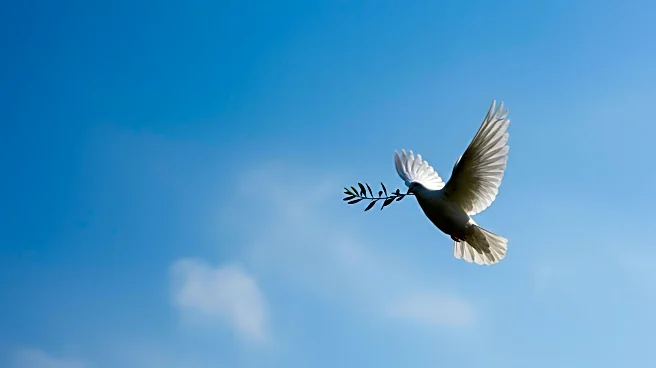What's Happening?
Ahn Hak-sop, a 95-year-old former North Korean soldier, is actively campaigning for his repatriation to North Korea after spending decades in South Korean prisons. Ahn, who was captured during the Korean War, attempted to cross the DMZ but was stopped by South Korean soldiers. Despite his fragile health, Ahn remains determined to return to North Korea, expressing his desire to do so in July. He was born in 1930 on South Korea's border island of Ganghwa and volunteered to fight for the North Korean army in 1952. Captured in 1953, he spent 42 years in prison before receiving a presidential pardon in 1995. Ahn had an opportunity to return to North Korea in 2000 but chose to stay in South Korea, vowing to campaign until U.S. troops are withdrawn from the South. His recent attempt to cross the border was symbolic, and he plans to join a protest in Seoul to further his cause.
Why It's Important?
Ahn Hak-sop's campaign highlights the ongoing tensions and unresolved issues stemming from the Korean War. His story underscores the complex relationship between North and South Korea, particularly regarding the repatriation of prisoners. The South Korean government has stated it has no immediate plans to repatriate remaining prisoners, and it is uncertain if North Korea would accept them. This situation reflects the broader geopolitical challenges in the region, including the stalled diplomacy and cooperation between the Koreas following the collapse of nuclear talks with Washington in 2019. Ahn's case also raises questions about the treatment and rights of long-term prisoners and the impact of historical conflicts on individual lives.
What's Next?
Ahn Hak-sop is expected to continue his campaign by participating in a protest in Seoul, advocating for his return to North Korea. The South Korean government may face pressure from activists and international observers to address the issue of repatriation for remaining prisoners. The situation could prompt discussions on inter-Korean relations and the broader implications for peace and stability in the region. Stakeholders, including political leaders and civil society groups, may weigh in on the matter, potentially influencing future diplomatic efforts between the Koreas.
Beyond the Headlines
Ahn Hak-sop's story sheds light on the personal struggles and sacrifices made by individuals affected by the Korean War. It raises ethical questions about the rights of prisoners and the responsibilities of governments in addressing historical injustices. The case also highlights the cultural and ideological divides that continue to impact the Korean Peninsula, influencing both domestic and international policies. Long-term shifts in inter-Korean relations could be triggered by such individual stories, emphasizing the need for reconciliation and understanding between the two nations.











